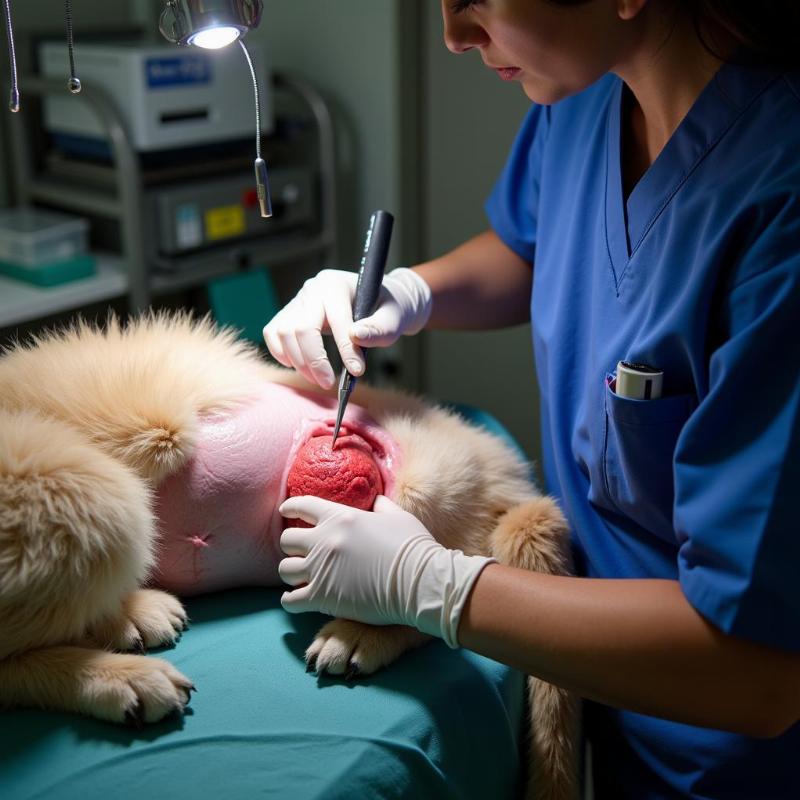Understanding the potential costs associated with exploratory surgery for your dog is crucial for making informed decisions. Exploratory surgery in dogs cost varies depending on several factors, including geographic location, the complexity of the procedure, and the specific veterinarian. This guide will provide you with a detailed overview of the typical expenses involved, helping you prepare financially and emotionally for your furry friend’s procedure.
Understanding Exploratory Surgery in Dogs and Its Associated Costs
Exploratory surgery, also known as exploratory laparotomy, is a diagnostic procedure performed when a dog exhibits symptoms that cannot be explained through non-invasive methods. It allows veterinarians to visually examine the abdominal organs and collect tissue samples for further analysis. While it can be a lifesaver, exploratory surgery in dogs cost can be a significant concern for pet owners.
 Exploratory surgery on a dog's abdomen
Exploratory surgery on a dog's abdomen
The cost of exploratory surgery typically encompasses several components, including pre-operative testing, anesthesia, the surgical procedure itself, post-operative care, medications, and potential complications. Let’s break down each of these factors:
Pre-operative Testing: Essential for a Safe Procedure
Before your dog undergoes exploratory surgery, your veterinarian will likely recommend pre-operative blood work, urinalysis, and possibly X-rays or ultrasound. These tests help assess your dog’s overall health, identify any underlying conditions, and ensure they are fit for anesthesia and surgery.
Anesthesia and Surgical Fees: The Core Expenses
Anesthesia is a critical component of exploratory surgery, ensuring your dog remains comfortable and pain-free throughout the procedure. The cost of anesthesia varies depending on the type used, the duration of the surgery, and your dog’s size and health. The surgical fees cover the veterinarian’s expertise and the actual performance of the exploratory procedure.
Post-Operative Care and Medications: Ensuring a Smooth Recovery
After surgery, your dog will require post-operative care, which might include hospitalization, pain management medications, antibiotics, and follow-up examinations. The length of hospitalization and the type of medications prescribed will depend on the findings of the surgery and your dog’s recovery progress.
Factors Influencing Exploratory Surgery Costs
Several factors can influence the overall cost of exploratory surgery in dogs. Geographic location plays a significant role, as veterinary costs can vary between urban and rural areas. The complexity of the procedure also contributes to the overall expense. For instance, if the surgery reveals a complex issue requiring additional procedures, the cost will likely increase.
Finding Affordable Options: Tips for Managing Costs
While exploratory surgery can be expensive, several options can help manage the financial burden. Pet insurance can cover a portion of the costs, making it a valuable investment for pet owners. Discussing payment plans with your veterinarian can also help make the procedure more affordable. Additionally, some veterinary schools or animal shelters offer discounted services.
Conclusion: Prioritizing Your Dog’s Health
Exploratory surgery in dogs cost can be a significant investment, but it can be a necessary step to diagnose and treat underlying health issues. Understanding the factors that contribute to the overall cost allows you to make informed decisions and prepare financially. Remember to discuss all your concerns with your veterinarian, who can provide a detailed estimate based on your dog’s specific needs.
FAQs: Common Questions About Exploratory Surgery Costs
- Does pet insurance cover exploratory surgery? Most pet insurance plans cover a portion of the cost of exploratory surgery, depending on the specific policy.
- What are the typical pre-operative tests required? Common pre-operative tests include blood work, urinalysis, and potentially X-rays or ultrasounds.
- How long is the recovery period after exploratory surgery? Recovery time varies depending on the complexity of the surgery, but it typically takes several weeks.
- What are the signs that my dog might need exploratory surgery? Symptoms like persistent vomiting, diarrhea, abdominal pain, or weight loss may warrant exploratory surgery.
- Can I get a cost estimate before the surgery? Your veterinarian can provide an estimated cost range based on your dog’s specific situation.
- Are there any financial assistance programs available for pet surgery? Some organizations offer financial aid for pet owners facing unexpected veterinary expenses.
- What are the potential complications of exploratory surgery? Potential complications, though rare, can include infection, bleeding, or adverse reactions to anesthesia.
Beautdogs.us: Your Trusted Source for Dog Care
Beautdogs.us is your one-stop destination for all things dog-related in the US. We provide expert advice on dog breeds, grooming, nutrition, and health, empowering you to provide the best possible care for your furry friend. Whether you’re a new dog owner or a seasoned pro, Beautdogs.us offers comprehensive resources to help you navigate the joys and challenges of dog ownership. For personalized assistance and expert advice, contact us at [email protected] or call us at +1 501-555-7529.